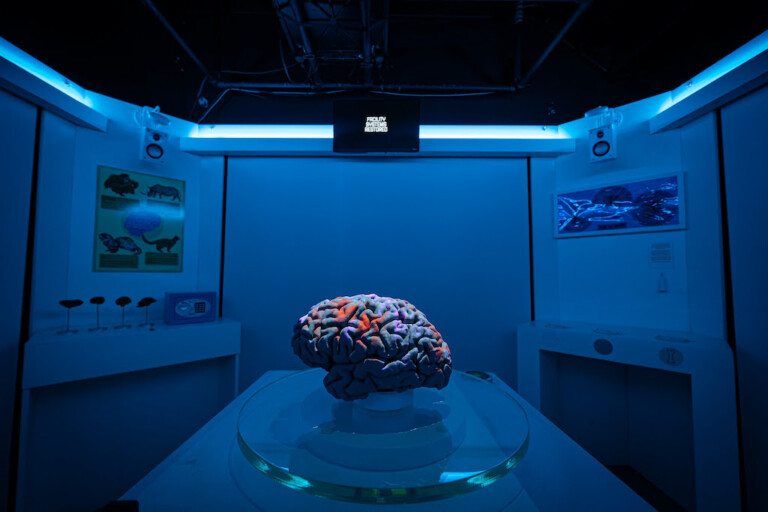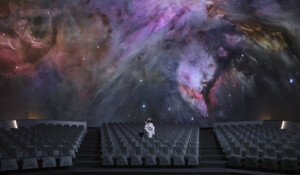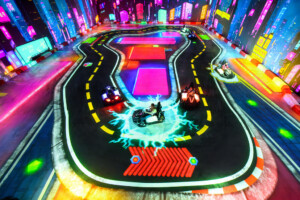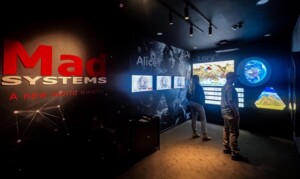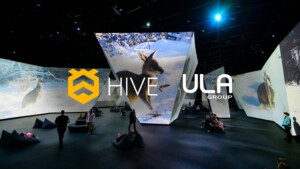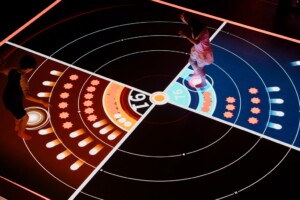LCI Productions, a leading multimedia show design and production company, has installed cutting-edge projection mapping technology to bring a new experience at the University of Oxford’s Neuroscience Department to life. The touring neuro-MRI-themed escape room experience is designed to increase the public’s scientific confidence and curiosity in the field of neuroscience.
The experience was designed as part of the University’s public engagement ambassador programme, with the intention of offering outreach in schools, community initiatives, science fairs, and museums. The University brought in LCI Productions to deliver the AV brains of the operation, including projection mapping, evolving audio scapes and cinematic lighting.
Beat the brain
The escape room begins with the introduction of an AI brain that has gained consciousness and is threatening to place the lab under lockdown. To beat the challenge, visitors need to complete a variety of physical and mental tasks with things like ticking timers, kinetic sand brains and tabletop puzzles, in order to outwit the evil brain. Along the way, these tasks, which bring in topics from MRI physics, image analysis and neuroscience, give guests an immersive experience of brain discovery.
LCI Productions provided state-of-the-art projection mapping solutions for the project, including an Optoma ZH406 Projector, which is used to project images onto the AI brain, a Brightsign XT1144 and two Brightsign HD22, as well as a UHD 32” Samsung Panel and HD 24” Samsung Panel. These are used to showcase real-life MRI imaging and brain scans throughout the challenges.
In addition, to bring together the cinematic lighting and visuals, the firm used an Enttec S-Play Light Show Controller with LED Tape and Driver, with a Custom 8 Way Relay Interface Unit.
A fun and educational experience
LCI’s design director, Rob Paul says: “The aim of the room was to create an experience that engages all of the senses and gets visitors’ brains working!
“Our team was able to create an environment that not only challenges players but also provides educational insight into the workings of the brain through the use of MRI imaging projections and actual brain scans taken from labs. We’re looking forward to seeing how visitors engage with the different technological elements we’ve incorporated.”
In order to provide a soundtrack that fits the subject of the space and encourages guests to interact with the neuro-themed objects, LCI also worked with audio designer Pastporte.
“We built different soundscapes to help tell the story, including an ambient soundtrack that plays throughout the duration of the game to build atmosphere,” says Ben Blackler, immersive experience designer at Pastporte. “The interesting part was formulating a sound trajectory that coincided with the brain’s activity. For the brain’s voice, for example, we took a lot of inspiration from 2001: Space Odyssey incorporating different robotic sound pitches to make it appear malevolent.”
Engaging visitors with the field of neuroscience
Amy Howard, PhD of Oxford Neuroscience Department says:
“By combining the excitement of an escape room with the fascinating world of neuroscience, we have the opportunity to engage and educate individuals in a unique and immersive way like never before. It’s been super fun working with LCI Productions and Pastporte to develop the narrative and bring our idea to life.
“Neurological concepts can be fascinating and intricate, and creating an escape room that showcases these topics can be a thrilling way to engage people’s curiosity and intellect. By immersing players in a world of brain teasers and puzzles, we can provide a fun and interactive way to explore the wonders of the mind and inspire a deeper understanding and appreciation for neuroscience.”
Last year, LCI Productions was appointed as a design consultant for a new immersive water display, as part of Southport’s waterfront regeneration.
